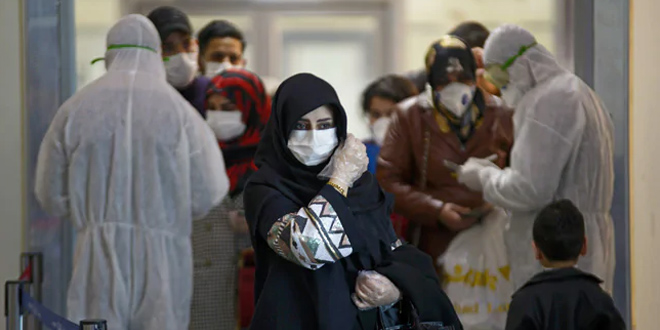Highlights
- Doubling time of COVID-19 cases improves to 17.4 days: Health ministry
- Unrealistic to expect that COVID-19 can be eliminated at this stage: Expert
- India has now become the world's 4th worst-hit country from COVID-19
New Delhi: As the country opens up and exits the nationwide lockdown imposed because of COVID-19 pandemic, in a phased manner, experts say that it is likely that the number of cases in hotspots is spiking up because of community transmission. However, they assert that saying that the entire country is in community transmission state will not be correct. This is because the epidemic is evolving in different ways and stages in different parts of the country but there is certainly a fear of community transmission in many places which is like to increase in the coming days. According to experts, it is important that the governments at the centre, state and local level lookout for early signs of community transmission and be prepared to tackle it.
Also Read: Unlock 1: Guidelines For Religious Places To Prevent The Spread Of COVID-19
A Joint COVID-19 Task Force formed by 16 medical specialists associated with Indian Public Health Association (IPHA), Indian Association of Preventive and Social Medicine (IAPSM) and Indian Association of Epidemiologists (IAE) recently released a joint statement on COVID-19 pandemic in the country ‘Public Health Approach for COVID-19 Control’ which show that community transmission of coronavirus infection is well-established across large sections or sub-populations in the country. The report said,
It is unrealistic to expect that COVID-19 pandemic can be eliminated at this stage given that community transmission is already well-established across large sections or sub-populations in the country. The expected benefit of this stringent nationwide lockdown was to spread out the disease over an extended period of time to flatten the curve and effectively plan and manage so that the healthcare delivery system is not overwhelmed. This seems to have been achieved albeit after 4th lockdown with extraordinary inconvenience and disruption of the economy and life of the general public.
However, the central government has maintained that the country has not yet reached the community transmission stage of the disease in any part.
Dr Puneet Misra, Professor at All India Institute of Medical Sciences (AIIMS), New Delhi, who is a member of the task force said,
India is a heterogeneous country in which the pandemic is evolving in different stages. If you talk about Delhi or Mumbai, definitely there is community transmission to some extent in these cities. One of the evidence for this is that for many cases with no travel history, it is not clear about how they have got the infection. Also, because of migrant workers travelling back to their villages and there are high chances that the disease could spread through them in villages. This is because many of them may be asymptomatic who could not be detected and isolated. Various states have reported that the migrant workers who have come back have found to be positive.
ICMR’s Sero-Survey Shows That The Country Is Not In The Community Stage Yet
Indian Council of Medical Research (ICMR) Director-General Balram Bhargava, said on Thursday while addressing the media that the preliminary findings of the first serosurvey on COVID-19 conducted in the country have shown that lockdown and containment measures were successful in preventing a rapid rise in infections, but a large proportion of the population still remains susceptible. A serosurvey involves testing of blood serum of a group of individuals to monitor trends in the prevalence of the COVID-19 disease in an area.
The survey conducted by ICMR in collaboration with the National Centre for Disease Control (NCDC) and the World Health Organisation (WHO), included 26,400 people who enrolled for it and 28,595 households visited in 83 districts. The findings show that only 0.73 per cent of the population in the districts surveyed had evidence of past exposure to SARS-CoV-2. The risk of getting infected is higher in the urban areas and urban slums than in rural areas. Mr Bhargava said that in containment zones, the risk of infection was found to be high but the prevalence in small districts is less than one per cent. He said,
India is such a large country and prevalence is very low that we have found that prevalence is less than one per cent in the small districts, in the urban areas it might be a little over one per cent and slightly higher in containment areas. India is not in community transmission.
Mr Bhargava asserted that even though the community transmission is not there, the risk is high in and the infection can spread. Therefore, non-pharmacological interventions such as physical distancing, use of face mask or cover, hand hygiene, cough etiquette must be followed strictly, he said. Urban slums are highly vulnerable for the spread of the infection and local lockdown measures need to continue as already advised by the government, he said.
The data provided by the Ministry Health and Family Welfare (MoHFW) show that the fatality rate of the infection is lower than 1 per cent and the recovery rate is almost 50 per cent. MoHFW said on Friday that the doubling time of coronavirus cases in India has improved to 17.4 days currently from 15.4 days a couple of weeks ago and 3.4 days at the beginning of lockdown. The union health ministry has advised states to focus on containment, testing and tracing, upgrading health infrastructure, clinical management and community engagement for effective management of COVID-19 and avoid community transmission stage.
[corona_data_new]















